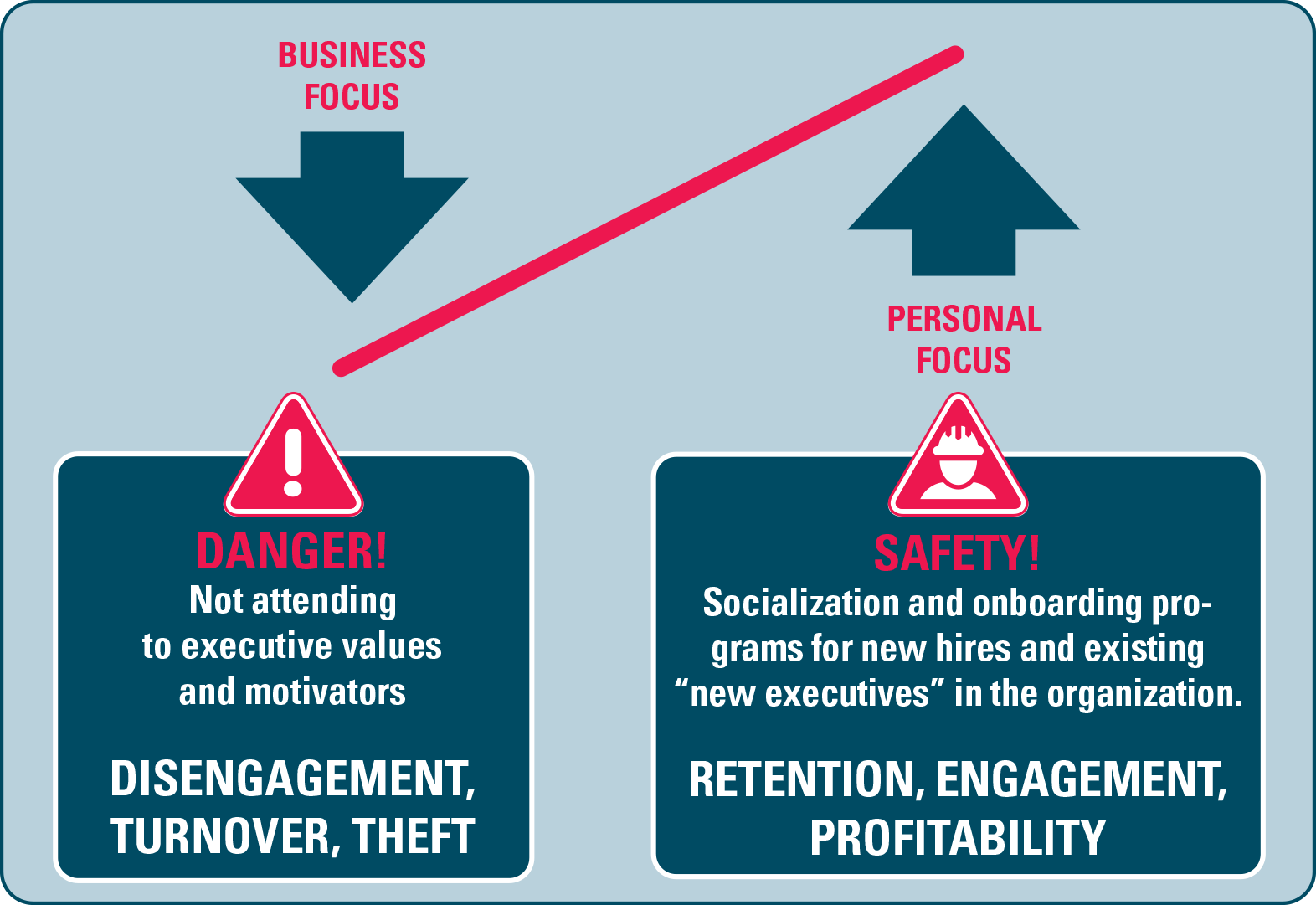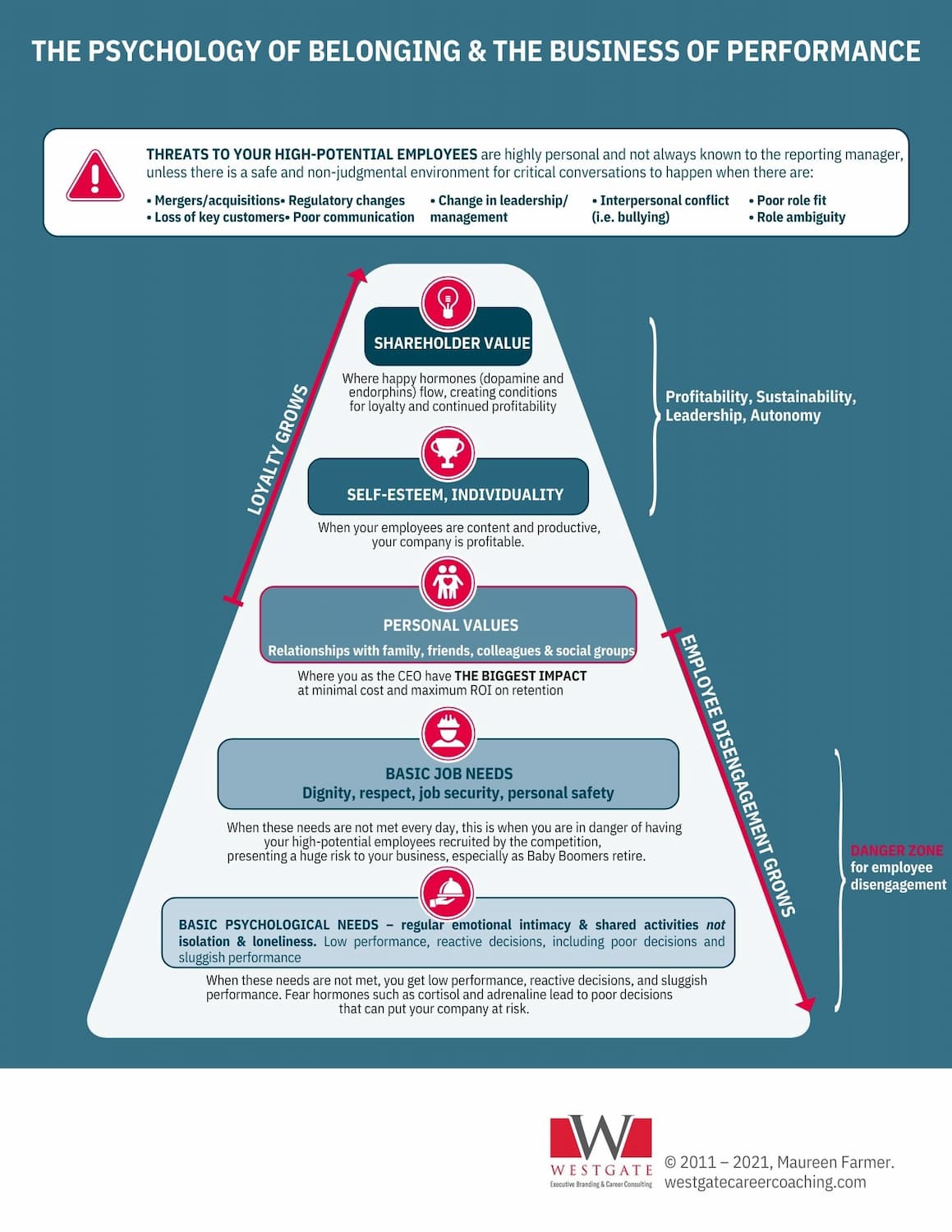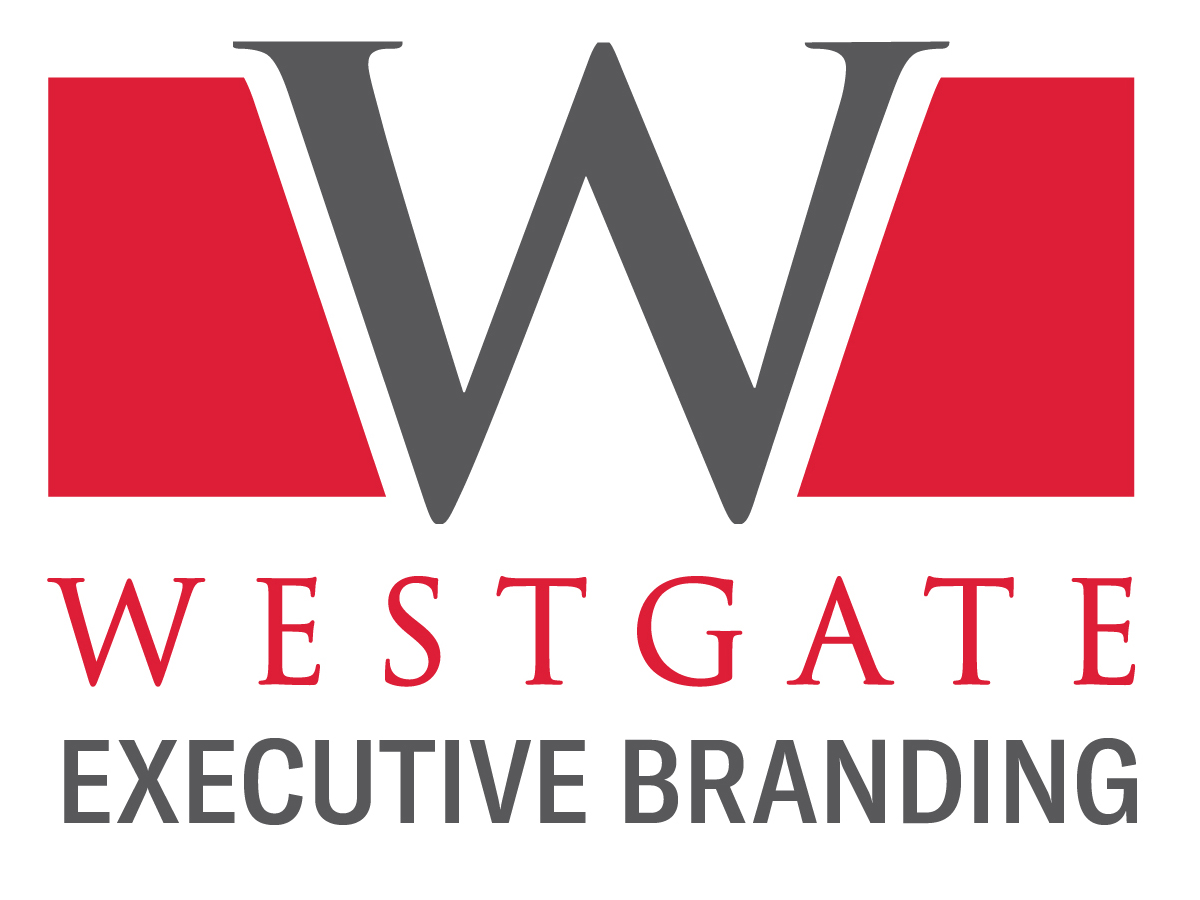Driving peak performance for CEOs and their boards, Westgate Executive Branding Offers Premier Advisory Services & Personal Branding Consulting for High-Profile Leaders. About Maureen—CEO & Founder.
In 2018, I conducted primary research by interviewing approximately 20 CEOs and industry leaders and high potential leader engagement. My thesis (and my observations based on my own 25+ years’ experience working in corporations) is that high-potential leaders (HP Leaders) are not always readily identified as candidates for senior-level roles thereby missing out on significant capacity building.
HP Leaders who are savvy about raising their visibility in the organization will generally do well and enjoy a robust upward trajectory. When HP Leaders are quiet and when their manager is quiet, HP Leaders may not be top of mind for plumb projects and succession planning opportunities. My experience and research indicate that leaders may be overlooking competent leaders.
This article explores the situation many organizations and their HP Leaders face as they attempt to build capacity for the future.
Is current job performance a predictor of future superior achievements?
Past performance often predicts (or should) future success, but often when HP Leaders are not in the best role for their strengths, performance can wane. While not optimal, I believe it’s typical, based on my years of experience working inside corporations.
“The problem is that current job performance has not been shown to be a reliable predictor of superior achievement in a higher-level position. According to current research by the Washington-based Corporate Leadership Council of the Corporate Executive Board, less than one third of all high‑performing employees have the critical abilities to excel at the next level of the organization.”
(Do ‘high-potential’ leadership programs really work? The Globe and Mail, Jan 2, 2012; CBCA Complete p. B.5., Karakwsky, Len; Kotlyar, Igor.)

Loyalty & the human element of leadership development
There is reluctance on behalf of corporate leaders to cross the line into the personal domain of their employees’ personal lives. Many leaders don’t know their employees’ values and motivations; there is a major opportunity cost in this situation because when we don’t know our people, we are not emotionally connected to them. Loyalty arises from interpersonal connection with others. Although we are unique individuals, the human condition unites us all as we all have a fundamental need to belong to a team.
The workplace is no different. Our position at Westgate is that we are the same people at work as we are outside work. The only difference is the degree to which we adapt our behavior. The more we feel the need to change our behavior at work (and depart from our most natural style), the greater the degree of burnout we will encounter. This is why it is critical that we understand the personal values high-potential employees bring and that we find ways to align them with our corporate values and we build a framework for success for both the business and the employee.
We are overlooking a unique opportunity to positively influence our employees by appealing to their personal values by aligning business imperatives with personal values.
At Westgate we use scientifically validated tools to uncover the values of HP Leaders, executives, and board members. Understanding what’s most important to colleagues helps to understand behaviors, decisions, and motivators. Unveiling the motivations and perceived agendas of others helps to deepen loyalty.
When business requires expertise in other geo-political locations
Consider the decision of a HP Leader to accept a new opportunity or promotion. Especially when there is a physical move involved, the employee will most certainly consult with his, her, or their family, and sometimes even the extended family on this decision. One’s family has significant influence over whether an opportunity is viable to the HP Leader.
The HP Leader’s family has influence over your business, its performance, and your pocketbook! Acknowledging the family’s role is a huge opportunity to enhance engagement with your people.
Our children and partners ...
Child and partner welfare is critical in the decision to take on a new role, yet electric utility organizations do little to ensure that families are settled safely in a new community. There is much fear and uncertainty in such a move, especially when children and partners move to a new state, province, or country without a social network to support them. The stakes are high emotionally and financially for everyone involved.
Families are NOT top of mind leaders today
Only when prompted during interviews for this whitepaper did respondents consider the impact on, and influence of, an employee’s immediate family when considering a promotion of their high-potential managers. Pathways to the C-suite often involve making lateral moves and taking geographical assignments that will take one’s entire family away from their community. This is where the risk of turnover resides.
Heart before the head ...
An energy industry Chief Technology Officer interviewed for Westgate’s research exclaimed that, “We need to get the heart before the head, and much more is required in the heart arena. This is more important than technical know-how, and it is common for professionals to be pigeon‑holed into roles. Many technical experts who are highly capable don’t get to move and expand. No one really knows them because no one asks. We focus on the hard skills and not on the person.”
A basic understanding of the HP Leader’s preferences and future plans will help with the heart arena. Career decisions are often made emotionally with significant input from family members. And it doesn’t need to be part of a corporate-wide succession or development plan to use this strategy. Smart managers want to know what’s important to the HP Leader. HP Leaders will appreciate the approach and trust is then established. Loyalty to managers is high when trust is established.
Corporate paradigm shift
A paradigm shift is required when considering a HP Leader’s leadership development plan, because many decisions relating to career and the world of work are negotiated with the HP Leader’s family.

Psychological safety is paramount to work performance and when executive management ignores the needs of their management teams and those of the lower-level teams, productivity wanes, disengagement, and turnover rises. When the board and the executive committee recognize their people and acknowledge them by taking a human interest, this can have a positive impact on relationships and deepen engagement.
Onboarding of key roles
According to Spencer Stuart and Harvard Business Review (CEO Selection: The Costs of Getting It Wrong, 2014), CEO turnover is between 30 percent and 50 percent and the turnover window appears to be within 18 months. Protecting the board’s investment in the CEO (as an example) with onboarding programs may reduce turnover and strengthen relationships with the board, employees, regulators, investors, and others in the business ecosystem.
Not only do these programs have a positive impact on the organization, but they also help to support the CEO’s family during a transition, especially when the family unit relocates for the CEO’s new role. Supporting the family unit in this way directly impacts the CEO’s onboarding experience and protects the Board’s investment in the CEO hire.
At Westgate, we have a number of proprietary tools and programs to assist the board by helping to support the CEO. The cost of these programs is dramatically less than the cost of the sourcing, recruiting, and selecting the key person. An independent third party can add value immediately during a stressful time for the CEO and the board.

Corporate onboarding processes can re-calibrate to ensure that it includes a personal component that helps the entire family settle in the community.
This includes children and spouses. Without the personal support of the employer, HP leaders may be lost to the competition. The reasons why are easily addressed but almost exclusively ignored, according to the evidence in this paper.
In one industry, for example, “Without strong support for strategic research in power systems engineering and without qualified replacements for retiring faculty, the strength of our Nation’s university-based power engineering programs Nation’s university will wane, and along with them, the foundation for innovation in the power sector to meet our energy challenges in the 21st century.” (Workforce Trends in the Electric Utility Industry, Department of Energy, August 2006)
Westgate's 90-Day Plan:
Whether you’re a new CEO, an experienced CEO, or a C-level planning to get hired up, you can use this comprehensive 90-day plan to jump start your year, maximize performance, and appease your investors. Like a Swiss Army Knife, the 90-day plan will help you master the job interview, master your first 90 days on the job, and serve as a continuous performance improvement tool.
“Organizations might need to expand the definition of “high potential” to include individuals who are older than the typical high-potential candidate.”
(The Aging Workforce: Leveraging the Talents of Mature Employees, p. 12, SHRM)
SOURCE: “SHRM Foundation’s Effective Practice Guidelines Series, The Aging Workforce: Leveraging the Talents of Mature Employees (Underwritten by a grant from the Alfred P. Sloan Foundation)”,
SHRM Foundation, Alexandria, Virginia, 2014.
“Atlantic Health System, based in New Jersey, allows retirees in the 1000 Hour Club to return to work either on a part-time or per diem basis three months after retirement. A retiree can work up to 999 hours annually and continue to collect retirement benefits.”
(The Aging Workforce: Leveraging the Talents of Mature Employees, SHRM, p. 13)
SOURCE: “SHRM Foundation’s Effective Practice Guidelines Series, The Aging Workforce: Leveraging the Talents of Mature Employees (Underwritten by a grant from the Alfred P. Sloan Foundation)”,
SHRM Foundation, Alexandria, Virginia, 2014.
“The best way to engage and retain HP Leaders is to provide a strong vision at the executive level, fair compensation, and competent, respectful supervisors.”
(Ibid p. 14)
SOURCE: “SHRM Foundation’s Effective Practice Guidelines Series, The Aging Workforce: Leveraging the Talents of Mature Employees (Underwritten by a grant from the Alfred P. Sloan Foundation)”,
SHRM Foundation, Alexandria, Virginia, 2014.
At Westgate we are pleased to offer a suite of bespoke programs to assist your board and your executive teams to optimize performance, deepen loyalty, and build capacity for your organization. Now in its second decade, Westgate is a 100 percent independent boutique professional services firm that offers executive coaching, career, and strategic communications consulting services for senior leaders.
Get in touch with us for a customized assessment of your board’s needs.

